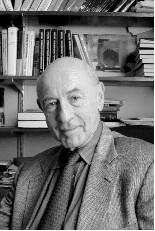A psychology of single questions
Gary Wolf
April 1, 2010
 Walter Mischel
Walter Mischel
I thought this might interest QS friends who are thinking about extremely simple systems of self-assessment. It is a paragraph about the influence of Walter Mischel that comes from the autobiographical sketch of Daniel Kahneman, on the occasion of his Nobel prize. I post this simply for inspiration, in case it is useful as a starting point for some of you.
I had learned a lot in Berkeley, but I felt
that I had not been adequately trained to do research. I
therefore decided that in order to acquire the basic skills I
would need to have a proper laboratory and do regular science – I
needed to be a solid short-order cook before I could aspire to
become a chef. So I set up a vision lab, and over the next few
years I turned out competent work on energy integration in visual
acuity. At the same time, I was trying to develop a research
program to study affiliative motivation in children, using an
approach that I called a “psychology of single questions.” My
model for this kind of psychology was research reported by Walter
Mischel (1961a, 1961b) in which he devised two questions that he
posed to samples of children in Caribbean islands: “You can have
this (small) lollipop today, or this (large) lollipop tomorrow,”
and “Now let’s pretend that there is a magic man … who
could change you into anything that you would want to be, what
you would want to be?” The answer to the latter question was
scored 1, if it referred to a profession or to an
achievement-related trait, otherwise 0. The responses to these
lovely questions turned out to be plausibly correlated with
numerous characteristics of the child and the child’s background.
I found this inspiring: Mischel had succeeded in creating a link
between an important psychological concept and a simple operation
to measure it. There was (and still is) almost nothing like it in
psychology, where concepts are commonly associated with
procedures that can be described only by long lists or by
convoluted paragraphs of prose.
A good popular account
of Mischel’s career by Johan Lehrer was published last year in the
New Yorker.


